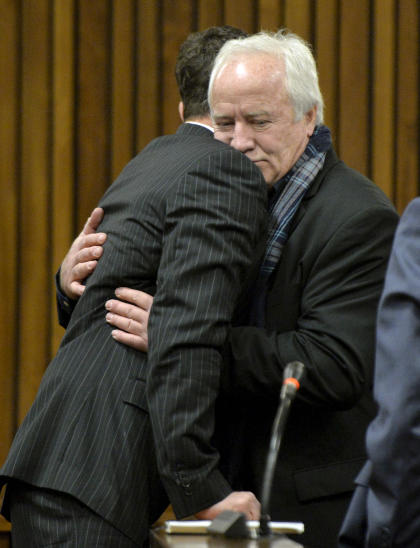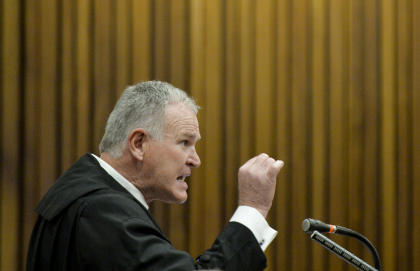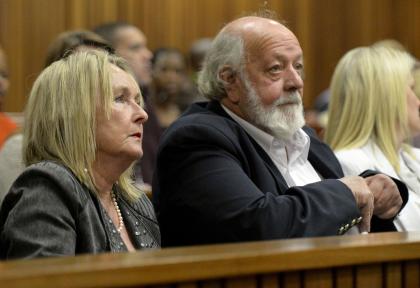Oscar Pistorius Trial Day 41: Defense says state's case is 'compromised' in closing statements
PRETORIA, South Africa – Through the nearly five hours of his closing arguments Friday, Oscar Pistorius' attorney, Barry Roux, moved from indignation to pleading, ending with righteous confidence and a demand for acquittal.
Pistorius, on trial for the shooting death of girlfriend Reeva Steenkamp on Valentine's Day 2013, barely moved while sitting stiffly in the dock during his attorney's robust speech – a summary of more than two hundred pages of written argument.
But after his legal team completed its presentation of his defense, palpable tension eased; his sister, Aimee, smiling for the first time in weeks, his uncle, Arnold, grinning from the public gallery.

A few hours later, Pistorius himself tweeted his gratitude after 41 days in court: "Thank you to my loved ones and those that have been there for me, who have picked me up and helped me through everything."
Although the strain of his murder trial may have diminished with the end of argument, it is not a reprieve.
The next time he returns to Courtroom GD – on Sept. 11 – it will be to hear Judge Thokozile Masipa's verdict.
Sliding scale of conviction options
Roux has given Judge Masipa a range of choices to consider, but ultimately the judge must make her decision based on what she believes was going on in Pistorius' mind, in the moment when he fired his 9mm pistol four times through a locked door.
Masipa has remained inscrutable throughout the trial, watching Roux's fervent arguments on Friday with her face resting on her hand.
It will come down to her belief in Pistorius' intent when he shot. Did he know he was firing at Steenkamp? Did he mean to kill?
"If you believe the accused meant to kill Miss Steenkamp, then you can take a red pen and draw a line through my entire argument," Roux told the judge as he began his closing arguments.
The defense insists that Pistorius had no intent to kill his girlfriend; that they were in a loving relationship and that, overcome with fear, he fired.
"He thought she was in the bedroom," Roux argued. "It didn't even cross his mind that she was in the toilet.
"He was fixated on his anxiety and his vulnerability and this intruder …"
Presuming that the court will agree with the defense on this critical point, the athlete's legal team has presented several options to the judge, each seemingly based on a different set of reasoning, in the hope that one will persuade Masipa from a murder conviction.
If, Roux explained, the court finds that Pistorius' actions were purely reflexive – that he fired because of a "startle" reaction, without consciously meaning to pull the trigger – "then he lacked criminal capacity" and should be acquitted.
If the court isn't convinced that's the case, and believes there were cognitive processes – that Pistorius considered the situation and acted against an intruder – "then it's putative self defense," said Roux, a principle pointing toward "culpable homicide," the South African equivalent of manslaughter, and not murder.
And if the judge is considering a conviction of "culpable homicide," she must then consider what would be reasonable in Pistorius' position. Roux explained, "It's a value judgment."
"There he is without legs, facing the door, hearing the sound and he fired the shots," Roux said. "If that's reasonable, then you must acquit!"
"If your finding is that it was not reasonable, then it is mitigation, it moves into a separate category" Roux said, suggesting that the double-amputee's disability must be considered in Masipa's deliberations.
Much of the defense's argument rests on Pistorius' inability to flee on his stumps, a point contested by the state.
Addressing the prosecution's push for a conviction of murder with dolus eventualis – a form of intent whereby someone can foresee that their actions could cause death, yet recklessly proceeds anyway – the defense put forward a different interpretation.

"He foresaw that it might be necessary to fire the shot," Roux said, but emphasized that this consideration was always in self-defense.
The defense has suggested that if Pistorius foresaw that he might fire, but didn't foresee he would fire at Steenkamp, it isn't murder.
Prosecutor Gerrie Nel was incredulous. "He knew there was a human being in the toilet. If he fired indiscriminately while knowing there's a human being, he is guilty of murder," he told the judge.
The state says that even if Pistorius did not mean to he shoot his girlfriend, even in his own account of events, he meant to shoot someone, proceeding to do so with a powerful weapon and lethal ammunition. Nel has argued that should not only constitute murder, but pre-meditated murder, which carries a mandatory life sentence in South Africa.
Objective facts
The defense insists that all the evidence is consistent with "an accident, a huge mistake."
A huge portion of the defense's written arguments consists of a detailed timeline, mapped using the phone call records of Pistorius' neighbors, and their testimony on the events of that morning.
With the exception of two neighbors – Johann and Annette Stipp – the timeline shows that their accounts fit with Pistorius' version of events.
It describes two sets of "bangs", just after 3 a.m., separated by several minutes of screams and cries.
It also deals with several key points of contention: the timeline shows that security guard Pieter Baba activated a guard checkpoint outside Pistorius' home at 2:20 a.m., and didn't hear an argument, despite a state witness testifying that she had heard a "voice like arguing" for an hour from just before 2 a.m.
The timeline also makes clear that if, indeed, the first set of "bangs" were Pistorius' gunshots, as he contends, the subsequent screams must have been his, given the extent of Steenkamp's head injuries, rendering her without cognitive function.
The objective facts are all "inconsistent with the intention to kill," Roux told Masipa, taking great pleasure in pointing out that the state prosecution had failed to produce a timeline, nor explained the cause of the first set of "bangs," given it said the second set were the gunshots.
Roux spent a significant amount of his argument attempting to discredit the Stipps. Their testimony is hugely damaging to the defense's impressive timeline at two points: they say Pistorius' bathroom light was on soon after the first "bangs" (meaning it was on either during the shots, or just after, which Pistorius denies); and critically, they testified to hearing a man's voice intermingled with a woman's screams (meaning there were two people crying out).
The defense, pointing out practical inconsistencies in its account, says the couple twisted its evidence to help the state's case.
No conspiracy, just incompetence
The defense's case also hinges on showing that the scene had been disturbed during and prior to police photographs being taken.

"We are not alleging a conspiracy," Roux said smoothly, "but they [police] must have inadvertently moved it. … They could not at the time know the importance of the evidence." In his interrogation of Pistorius on the stand, prosecutor Nel made much of the forensic photographs, declaring that, as objects could not have been where the athlete said they were, he must be lying.
Roux countered, telling the court Nel had lied to his client.
On Friday, Roux produced a photograph showing a stretched, lengthy extension cord – a controversial piece of missing evidence that the state said proved Pistorius had tailored his testimony, as it would not have reached a specific plug. The defense lawyer acknowledged Pistorius' poor performance on the stand, but suggested that his diagnosed anxiety, depression and post-traumatic stress affected his memory and testimony.
Shrill with indignation, Roux came to his client's defense, insisting that while Pistorius may have been argumentative during his cross-examination, he had been made more apprehensive by the prosecution's decision to push a charge of pre-meditated murder.
The defense says the prosecution's case has been "compromised" by a failure to show such significant photographic evidence to court, as well as the decision not to call certain key witnesses, including former investigating officer Hilton Botha, whose testimony was revealed to be false during Pistorius' bail application.
In order for the state's version of events to be true, the athlete would have had to entirely construct his detailed account, Roux pointed out.
When would the accused have had an opportunity to stage the scene, opening the bathroom window and moving evidence, Roux asked. "In his traumatized state of mind, he came up with this elaborate version?" He shook his head. "It cannot be."
What's next?
Court will reconvene for judgment in just over a month on Thursday, Sept. 11. Judge Masipa and her two assessors will now retire to deliberate. If the two assessors disagree with the judge, they can overrule her, in essence, acting as a sort of mini-jury.
After Masipa delivers her verdict – which could take more than a day, depending on the length of her written judgment – both sides will be given the opportunity to provide further argument on any factors, mitigating or otherwise, that should be considered during sentencing.
At this point, if prison time is on the table, the defense is likely to request "correctional supervision," a report that will determine the suitability of a detention facility for Pistorius, a double-amputee. This process could take up to six weeks, after which sentencing will take place.
Beyond that point, Pistorius then has two weeks to appeal any decision by the court – both regarding his conviction and his sentence.
It could be some time before the athlete knows exactly what his future holds.
